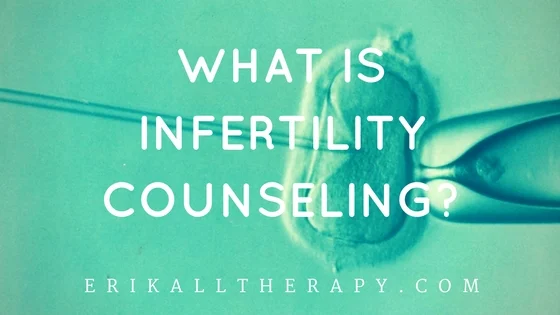What is Infertility Counseling?
It’s easy to recognize that infertility is an extremely difficult period in someone’s life, but from my experience most people don’t even think about going to therapy during this time. This struck me as odd when I was first starting my private practice. It’s an isolating, depressing, emotional, and burdensome process with cyclical grief (more on this later), so from my therapist lens I imagined that anyone and everyone going through infertility would seek counseling. But to my surprise, not a lot of people even realize therapy is an option, and even fewer understand what infertility counseling is.
It’s kind of interesting that now I am considered an expert on infertility and I see many clients that are going through or have gone through infertility; however, most of those clients did not call me looking for infertility counseling. My clients typically seek out services for other reasons with infertility as something they never considered getting help for. But most of the experiences that come along with infertility greatly affect all areas of your life, from your personal functioning, relationship satisfaction, health, mood, and work. Some of the reasons that people may come for infertility counseling are:
Feeling “stuck” and difficulty making decisions
Feeling depressed or anxious
Being preoccupied with thinking about infertility
Persistent feelings of sadness, guilt, or worthlessness
Social isolation
Mood swings
Marital or relationship problems
Family problems
Unable to communicate and agitation related to talking to others
Difficulty with “scheduled” intercourse
Trouble concentrating
Increased alcohol or drug use
Thoughts of suicide or death
Changes in appetite, weight, or sleep
Why don’t people come for infertility counseling?
From my experience, people simply don’t think about counseling as a potential option, and more importantly, the few times they’ve tried to communicate with someone about their infertility things didn’t go so well. Infertility is an area that most people do not understand at all, so when someone going through infertility makes a giant leap and decides to talk to someone in their life (usually a close friend or family member), that conversation is often awkward and inadvertently hurtful. The infertile person can easily shut down, and with the social isolation factor and roller coaster of emotions, it’s easy to see how disastrous these discussions can be. Add that to the fear people have about going to therapy, and it’s a bad combination.
Furthermore, there is the cyclical grief process. You’ve probably heard about the grief process if you’ve ever known anyone that died or has a serious medical problem. There are five stages (denial, anger, bargaining, depression, and acceptance) and you can move in and out of the stages at different times and go back and forth. Now, for someone trying to get pregnant, you have about two weeks between your period and ovulation, so that is time to get excited, hopeful, scared, nervous, and anxious. Then comes the two-week waiting period between ovulation and your next expected or hopefully missed period. That’s more time to hope, get discouraged, feel grateful, be sad or hopeless, and many other emotions along a wide spectrum. Then, you (or your partner) gets a period, indicating that yet again you are not pregnant. This is considered a grief related event, but it’s moving at warp speed. And once things start to get better, the cycle begins again. A person going through infertility rarely gets a break from this grief, and it’s devastating. At the same time, during certain weeks or days, the person can feel normal, optimistic, and hopeful. This rapid-fire cycle is another reason people don’t come to therapy, things are moving too fast and they have trouble thinking about slowing down to process their experiences.
Why people should come to infertility counseling?
Infertility counseling is multifaceted and has many stages. To be honest, the beginning is essentially crisis management. Most clients come in, individually or as a couple, and need some time just to get everything out. Partners aren’t always on the same page as to how to proceed medically. Emotions are high and that needs time, attention, and to be honored. I think having permission to truly feel these emotions, and say some of the hardest most uncomfortable thoughts out loud to someone who won’t judge you but listen openly is one of the most healing experiences you can have.
As therapy continues, there are opportunities to work on communication with your partner, family, and friends and how to handle social situations and questions you will be asked. Partners can work on getting on the same page as well as what this experience means to each person. An infertility counselor can help you through each stage and each new part of your journey by helping you come to a place of acceptance and hope. The future may not always look how you thought it would, but that doesn’t mean it won’t be beautiful.
Infertility counseling is kind of new and something close to my heart. I’m passionate about more clearly defining what it is and how it can help people facing infertility. If you would like to know more or want to know specifically how I can help in your situation, call me for your free 15-minute phone consultation (832) 827-3288. I am a Marriage and Family Therapist and infertility expert in private practice in the Clear Lake area of Houston, Tx. I’m looking forward to starting this important work with you; you deserve to have support and guidance as you go through this journey and know that I am here for you.
If you are in another city or state, you can also look up qualified infertility counselors on Resolve.org.

